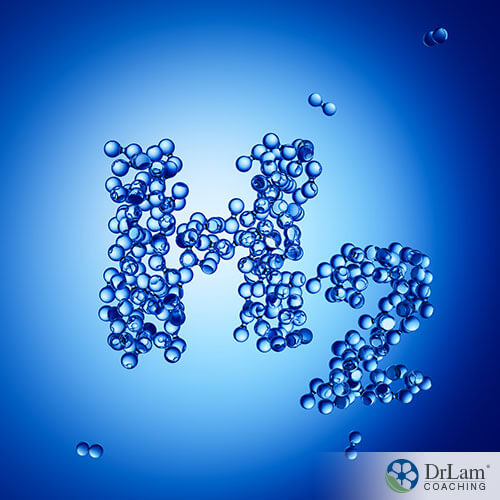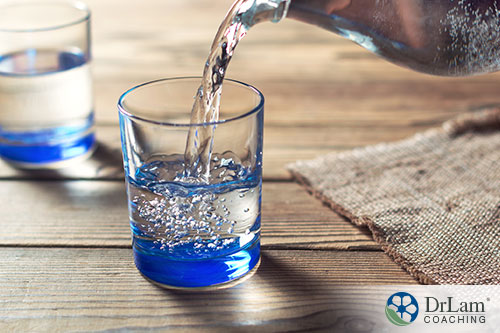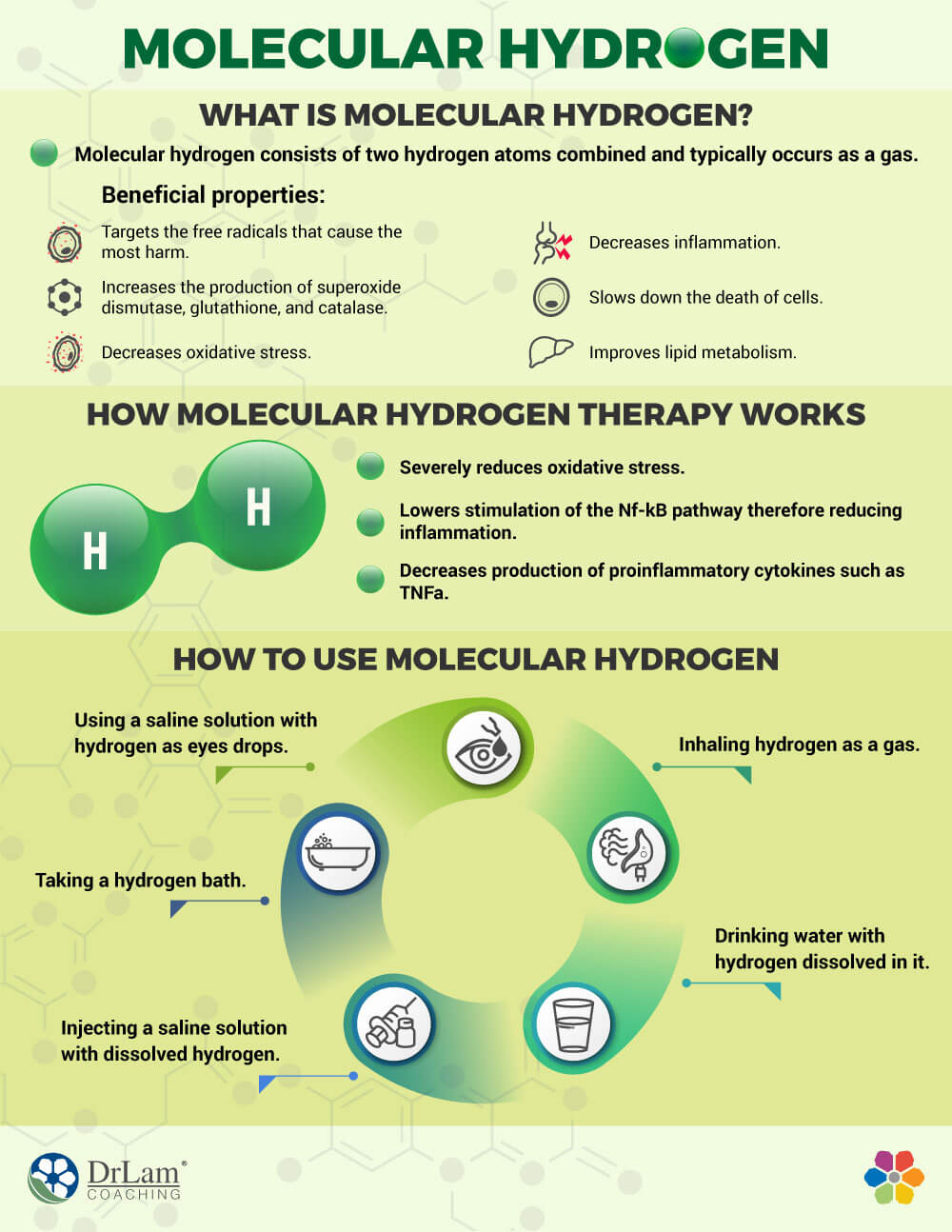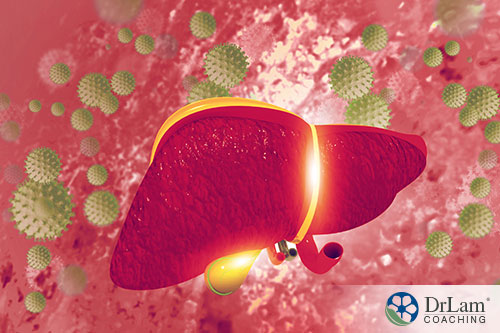 Although an increasing number of studies have supported its use, few people have heard of molecular hydrogen or the promise it shows for dealing with a large number of health conditions. Due to what appear to be powerful anti-inflammatory actions and a strong protective effect against oxidative stress, molecular hydrogen could be useful for many serious health problems.
Although an increasing number of studies have supported its use, few people have heard of molecular hydrogen or the promise it shows for dealing with a large number of health conditions. Due to what appear to be powerful anti-inflammatory actions and a strong protective effect against oxidative stress, molecular hydrogen could be useful for many serious health problems.
The most abundant element, molecular hydrogen occurs most frequently in water (H2O) and organic compounds. Colorless, flammable, tasteless, and with no odor, it plays an essential role in all human life. Known as the lightest and smallest atom, it is also the most abundant element. While flammable between 4-75% saturation, molecular hydrogen has been shown to be safe for use in humans if kept under 4%. Only recently did the marvelous therapeutic benefits of molecular hydrogen become clear.
Consisting of two hydrogen atoms combined, molecular hydrogen typically occurs as a gas. One of its special qualities consists of its very selective antioxidant properties. It particularly targets the free radicals that cause the most harm. Its basic method of working involves improving the redox status of cells.
In so doing, it increases the production of superoxide dismutase, glutathione, and catalase. It works to reduce the most toxic radicals and decreases the development of excess free radicals in the first place.
As a powerful antioxidant in itself, molecular hydrogen also stimulates the Nrf2 pathway as needed. This pathway forms an important part of your longevity and overall health. This biochemical also helps increase the production of cell-protective enzymes.
Because of its small size, this biochemical can penetrate into cells as needed. Its many beneficial properties include decreasing oxidative stress, decreasing inflammation, slowing the death of cells, and improving lipid metabolism.
Given that molecular hydrogen can greatly reduce the expression of genes that promote inflammation and significantly decrease the hydroxyl radical, it may significantly improve symptoms of viral infections. It appears to accomplish this by suppressing the cytokine storm and oxidative stress seen in these kinds of infections.
Current research suggests this biochemical can significantly and effectively decrease oxidative stress from reactive oxygen species (ROS) and the action of hydroxyl radicals. While not yet clear on how it reduces hydroxyl radicals, scientists believe it works through a gaseous-modulator effect rather than through the actions of a conventional antioxidant.
The scientific literature shows hydrogen to possess strong anti-inflammatory effects. Likewise, it can positively influence your immune system. It does this in four ways:
In addition, molecular hydrogen stimulates the production of strong anti-inflammatory cytokines such as IL-10 and IL-22. Although the mechanism of this kind of stimulation remains largely unknown, the scientific data clearly shows hydrogen’s ability to do it.
Also, hydrogen reduces the infiltration of inflammatory cells and decreases the production of chemokines. This works to inhibit a number of immune and/or inflammatory responses in some white blood cells. This leads to a strong anti-inflammatory effect in your body.
Hydrogen can be administered in several ways to achieve its therapeutic effects. These methods of administration include:
 Inhaling hydrogen as a gas.
Inhaling hydrogen as a gas.Whichever of these methods you decide to use, it appears best to use hydrogen in a cycle or pulsed manner rather than continuously. If used continuously throughout the day, the effects of hydrogen tend to dissipate or stop altogether.
Drinking water that contains extra molecular hydrogen allows a high concentration of hydrogen into your cells. With this method, you will get about five minutes of peak blood levels of hydrogen. At this time, the best increases in cell signaling and gene expression occur.
To get this type of water, dissolve two molecular hydrogen pills in a liter of water. In no more than a couple of minutes, the water turns ‘white’ indicating a concentration of hydrogen. For the best results, you should drink the entire liter as fast as possible. But if this is too much to drink, you should space it out over no more than a morning. Then, in the afternoon, dissolve one pill in a half-liter of water and drink it. Drinking the full liter in the morning gives you a strong pulse of hydrogen for the best results.
Inhalation appears to be the best way to receive hydrogen.
For your safety, the hydrogen gas should remain under 4%. Any level above this may become an explosion hazard. Units are available on the market that produce this level of hydrogen through water electrolysis.
This method of inhaling hydrogen shows tremendous potential therapeutically because it allows large amounts of hydrogen to access your bloodstream through the lungs. This makes it available throughout your body quickly. A good machine can generate 99.9999% pure H2 molecular hydrogen with no wastewater. Simply attach a nasal cannula and you can breathe in pure H2. The suggested rate is 300-400 mL/min for 20-60 minutes per session. You can breathe in nearly 200 times the H2 than that in one 500 mL bottle of H2 water.
This method of administration is very simple. It can take place via a facemask, ventilator circuit, or nasal cannula. Because molecular hydrogen becomes available quickly through this method of administration, it is very effective against acute oxidative stress. In addition, it does not affect blood pressure in those people with heart complications.
This method of administration has also proven effective in organ transplants. It reduces injury to intestinal and pulmonary implants and helps prevents inflammation in transplanted organs. Research has found that the use of only 2% hydrogen gas brought improvement in gastrointestinal transit, lowered lipid peroxidation, and inhibited the production of pro-inflammatory cytokines.

The main focus of the NeuroEndoMetabolic (NEM) Stress Respons remains that of keeping your body in a state of homeostasis in the face of stress. However, even the NEM circuits can get overwhelmed and begin showing significant symptoms of dysfunction. In severe cases of Adrenal Fatigue Syndrome (AFS), the NEM circuits struggle to meet the demands placed on them by continuing stress. It appears molecular hydrogen can greatly improve the functioning of these circuits.
Due to its tremendous potential for dealing with and eliminating inflammation and oxidative stress, hydrogen brings significant benefits to this circuit. Research with animals has found the inhalation of hydrogen gas to improve lung function, decrease mucus production, fight inflammation, and reduce oxidative stress.
Molecular hydrogen also has beneficial effects in dealing with lipopolysaccharide-induced neuroinflammation. It appears to promote the expression of anti-inflammatory genes, to inhibit the expression of pro-inflammatory genes such as tumor necrosis factor-alpha, and in general to stimulate anti-inflammatory genes.
This reduction of inflammation can go a long way to helping the adrenal glands heal.
 Other benefits of inhaled molecular hydrogen in these research models included lowering the levels of Th2 type cytokines IL-4 and IL-13 in both the examination of lungs through bronchoalveolar lavage and blood samples. These two types of cytokines tend to increase the number of eosinophils released, decrease airway function, and stimulate the hypersecretion of mucus. Therefore, inhibiting them may explain improved airway function and the reduced accumulation of inflammatory cells in lung tissues.
Other benefits of inhaled molecular hydrogen in these research models included lowering the levels of Th2 type cytokines IL-4 and IL-13 in both the examination of lungs through bronchoalveolar lavage and blood samples. These two types of cytokines tend to increase the number of eosinophils released, decrease airway function, and stimulate the hypersecretion of mucus. Therefore, inhibiting them may explain improved airway function and the reduced accumulation of inflammatory cells in lung tissues.
One of the more common causes of hospital deaths, sepsis represents a failure of the immune system against infections caused by bacteria, viruses, or fungi. This can happen when the immune system becomes overwhelmed by the volume of pathogens it needs to deal with or when it becomes so weakened by other factors that it can’t function.
One of the important factors in this complex process of sepsis involves oxidative stress and the failure of antioxidants to handle it. This results in apoptosis, mitochondrial failure, and the activation of responses from the inflammation, immune, metabolic, hormonal, and bioenergetic systems. Along with this comes the leaky gut phenomenon in which bacteria, pathogens, and endotoxins gain access to your circulatory system and become systemic.
Inhalation of molecular hydrogen may be effective in dealing with sepsis by decreasing levels of pro-inflammatory cytokines. In addition, it also helps lower oxidative stress, reduces neuroinflammation, and lowers the rate of neuronal apoptosis brought on by sepsis. Also, laboratory evaluations showed a reduction of changes in the hippocampus and increases in antioxidant activity in the brain.
In addition, the use of molecular hydrogen does not interfere with either metabolic or signaling systems in the body.
Through its ability to fight oxidative stress so effectively, molecular hydrogen research shows it may have significant protective functions for the heart. Much of the research involves animal models, but the results may prove applicable to humans.
Oxidative stress plays a major role in the damage done to your heart when you experience a heart attack. Research shows hydrogen gas-saturated saline infusions to utilize anti-inflammatory actions and antioxidant activity to protect your heart against this kind of organ damage.
The mechanisms involved here include increasing the levels of superoxide dismutase and decreasing IL-6 and Tnf alpha in blood and cardiac tissue. In addition, pretreatment with hydrogen-rich saline decreased the size of the damaged heart muscle, decreased pathological changes of the left heart, and improved left heart function.
The development of plaque deposits in the arteries, known as atherosclerosis, signals impending heart problems. However, dietary antioxidants used in clinical trials do not typically show success in preventing this build-up.
The antioxidant activity of molecular hydrogen, however, has been shown to be successful in reducing atherosclerotic lesions. Consuming hydrogen-dissolved water appears to work best to prevent atherosclerosis.
Detrimental changes in heart rhythms represent an increasing number of cardiac arrests that occur out of the hospital. These occur typically with a poor prognosis. However, research shows inhalation of molecular hydrogen leads to significantly better left ventricular ejection fraction, better neurological deficit scores, and improved cardiac work. In this study, the survival rate of the animals in the research after ninety-six hours was significantly better than the other treatment option or the control group.
Scientists concluded that small amounts of the inhaled hydrogen gas proved superior to mild hypothermia, the other treatment option, in improving both cardiac outcome and neurological function.
Excess reactive oxygen species (ROS) may lie at the foundation of the development of oxidative stress. A number of conditions can lead to the development of oxidative stress. These include:
 Inflammation
InflammationIf oxidative stress becomes chronic or continuous, it may lead to the development of lifestyle-related diseases, cancer, or aging. However, many antioxidants in current use show high levels of toxicity that limit their therapeutic usefulness. The narrow range of therapeutic dosages does not effectively address this kind of oxidative stress or the prevention of related illness conditions.
Because of this limitation, the development of effective antioxidants that work with few or no side effects assumes great importance in dealing with many conditions, including heart-related conditions.
Oxidative stress protects against cardiovascular conditions in a number of ways. These include downregulating pro-inflammatory and inflammatory cytokines. Some of these downregulated cytokines include:
Through these mechanisms, molecular hydrogen protects the heart against injury and protects against the development of atherosclerosis and other vascular conditions.
Other research into the effects of hydrogen on oxidative stress shows it to work to reduce other markers of oxidative stress and apoptosis. These include:
Hydrogen works to keep the levels of these cytokines within the normal homeostatic range or to prevent the levels from diverging from this range.
Reducing oxidative stress is also vital to adrenal fatigue recovery.
Comparatively little research on the effects of molecular hydrogen on the reproductive system has occurred. However, animal models show the powerful antioxidant action of hydrogen does help with ovarian injury sustained during chemotherapy and showed promise in protecting the reproductive system in rats with preeclampsia.
Some other research shows hydrogen plays a role in modulating signals that regulate the production of testosterone in males. This mechanism may improve male testosterone production through cellular redox balance.
In addition, hydrogen shows promise in attenuating loss of male germ cells and in protecting the production of sperm in male rats exposed to radiation.
Because molecular hydrogen can cross the blood-brain barrier, it appears to be effective in dealing with central nervous system conditions as well. Some animal research indicates drinking hydrogen water alleviates symptoms of Parkinson’s disease, again through the reduction of oxidative stress.
In similar research, scientists found injecting hydrogen-infused saline helped improve the cognition and memory of rats with Alzheimer’s-like conditions. The decrease in oxidative stress and neuroinflammation seemed to occur through suppressing abnormal IL-1B, JNK, and Nf-kB activation.
Research also indicates molecular hydrogen has been effective in dealing with impaired cognition, ischemia-related brain injury, and SAH-induced early brain injury. However, this research has been conducted on animal models only.
 The accumulation of oxidative stress in the liver comes from other sources inside the body. These include the storage of unsaturated fatty acids, TNF alpha action, and inflammatory cells that infiltrate the liver. This oxidative stress increases inflammation in the liver, often leading to liver disease.
The accumulation of oxidative stress in the liver comes from other sources inside the body. These include the storage of unsaturated fatty acids, TNF alpha action, and inflammatory cells that infiltrate the liver. This oxidative stress increases inflammation in the liver, often leading to liver disease.
Research has found that drinking hydrogen water lowered the levels of oxidative stress nearly to that of non-diabetic control animals. In addition, research also indicated molecular hydrogen helped to reduce the oxidative stress that leads to free radical chain reactions in Non-Alcoholic Fatty Liver Disease. In addition to the antioxidant action of hydrogen in this research, the levels of TNF alpha also decreased.
Metabolic syndrome typically occurs with people who suffer from metabolic dysfunction. The combination of abdominal obesity, insulin resistance, high blood pressure, and dyslipidemia characterizes this syndrome.
Once again, oxidative stress plays a major role in this condition. A large number of studies show the benefits of hydrogen in dealing with metabolic syndrome. Along with the reduction of inflammation, molecular hydrogen's antioxidant activity decreases the risk of health issues that come with this syndrome.
The use of hydrogen also inhibits the development of type 2 diabetes, which often comes with metabolic syndrome. The improvement of glucose metabolism and the decrease of oxidative stress lies at the root of this benefit.
Molecular hydrogen, the most abundant and smallest of the elements, only recently came to the attention of scientists and clinicians for its potential in medical research and treatment. Currently, research continues into its ability to fight oxidative stress, decrease inflammation, and reduce the numbers of even the most potent of the free radicals. In addition, it fights against apoptosis and brings beneficial effects to signaling pathways.
Its most effective property involves suppressing the cytokine storm that often occurs with viral infections. This makes it useful in dealing with the influenza virus and COVID-19.
Regarding its potential usefulness against COVID-19, research shows it helps protects the lungs from damage due to viral infections.
Routes of administration of molecular hydrogen include drinking hydrogen water, inhaling the hydrogen gas in concentrations under 4%, dropping hydrogen-infused saline into the eyes, taking baths in hydrogen water, and injecting hydrogen-infused saline. Of these, inhalation provides the most accessible hydrogen to the body. A face mask, nasal cannula, or ventilator can provide the vehicle for inhalation.
Research shows numerous benefits for people suffering from AFS or associated NEM dysfunction. In general, the antioxidant and anti-inflammatory properties of molecular hydrogen make it very beneficial for AFS sufferers.
Its ability to suppress pro-inflammatory cytokines is very beneficial for the immune system in general. In addition, its antioxidant activity helps protect the heart and vascular system.
Although little research into the effects of hydrogen on hormones and the reproductive system has been completed, animal research suggests its effectiveness in male infertility issues. Also, it appears effective in protecting the female reproductive system from damage.
The ability of hydrogen to cross the blood-brain barrier indicates it may also serve a neuroprotective function in dealing with neurological issues in the brain and central nervous system.
In the liver, it also has protective action due to its ability to reduce oxidative stress and inflammation. Interrupting the ability of oxidative stress to stimulate the production of free radicals appears to be the key.
Hydrogen may bring benefits to those with metabolic syndrome as well. Once again, dealing with oxidative stress and inflammation lies at the root of these benefits.
 If you’re interested in using molecular hydrogen, you should consult with your healthcare professional to investigate your options. He or she can help you decide if this technique may be appropriate for you and can help you choose the most appropriate method of use. Don't just start hydrogen therapy without proper guidance.
If you’re interested in using molecular hydrogen, you should consult with your healthcare professional to investigate your options. He or she can help you decide if this technique may be appropriate for you and can help you choose the most appropriate method of use. Don't just start hydrogen therapy without proper guidance.
If you would like to know more about or need assistance with molecular hydrogen, the team at Dr. Lam Coaching can help also. We offer a free** no-obligation phone consultation at +1 (626) 571-1234 where we will privately discuss your symptoms and various options. You can also send us a question through our Ask The Doctor system by clicking here.
Molecular hydrogen is a powerful antioxidant that significantly decreases the amount of oxidative stress present in your body. This goes to the root cause of many illness conditions, including some cases of AFS. By inhibiting the production of pro-inflammatory cytokines, it also decreases inflammation overall.
